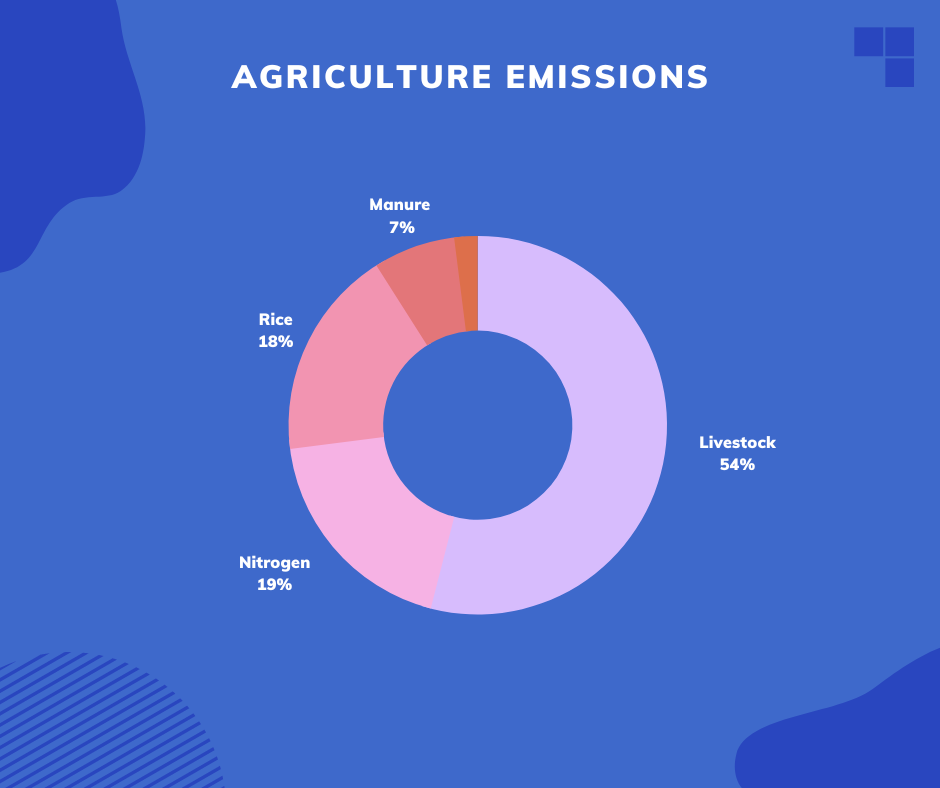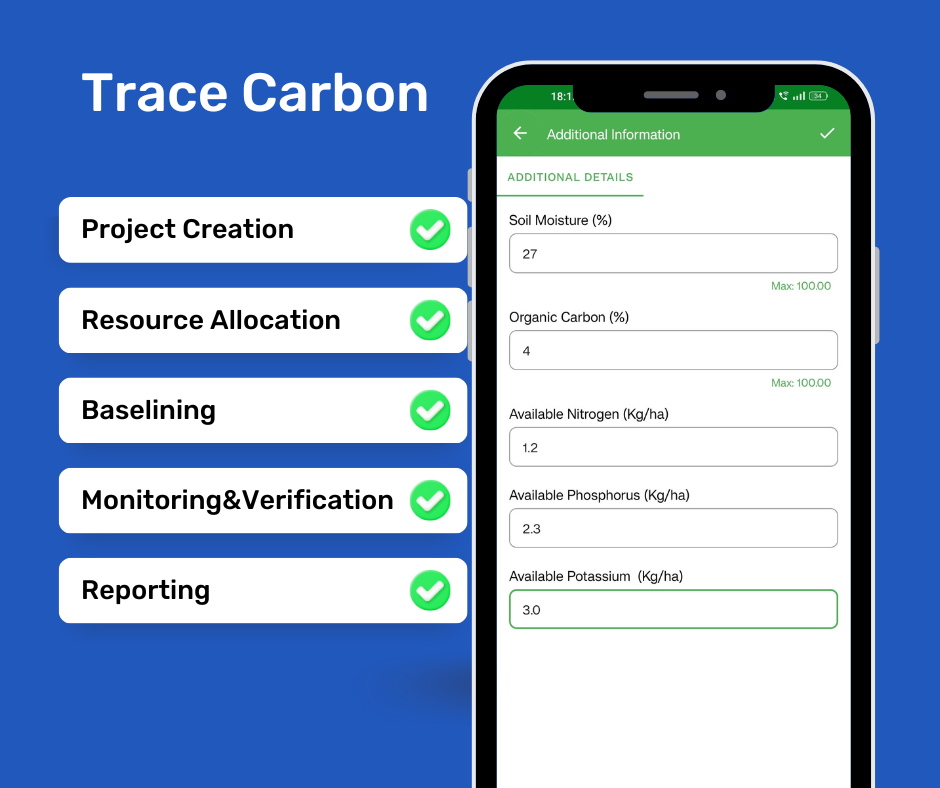Contact: +91 99725 24322 |
Menu
Menu
Quick summary: Discover how TraceX's comprehensive module Trace Carbon unlocks sustainability by effectively managing carbon footprints. Harness the power of blockchain and data-driven technologies for enhanced transparency and accountability. Learn how traceability solutions can drive positive environmental impact. Read our blog post now!

In today’s world, carbon management and emission reduction have become critical in the fight against climate change. The alarming rise in greenhouse gas emissions and their detrimental effects on the environment necessitate innovative solutions to address carbon footprints especially in the food and agriculture industry.
The World Resource Institute (WRI) estimates that carbon dioxide emissions from human activities reached a record high of 55.3 billion metric tonnes in 2020, contributing to the growing climate crisis.
As the urgency to mitigate climate change grows, organizations worldwide are seeking effective ways to measure, manage and reduce their carbon footprint.
Leveraging blockchain technology, these solutions enable organizations to make meaningful progress towards a greener and a more sustainable future. Let us explore these solutions in depth and how they help companies to accelerate their decarbonization journey.
Barack Obama, the former US President rightly said, “We are the first generation to feel the effect of climate change and the last generation who can do something about it.”
With nine out of ten hottest years on record occurring in the last decade itself, climate change is the biggest challenge facing humanity and is impossible for anyone to ignore. We need to reduce the greenhouse gas emissions and chart a path to net-zero emissions, especially in taken for granted industries like fossil fuel and agriculture.
The farm sector in India accounts for 19.6% of country’s total greenhouse gas emissions. Agriculture emissions in India are primarily from the livestock sector in the form of methane emissions due to enteric fermentation and the use of nitrogen fertilizers in agriculture soil that emit nitrous oxide, rice cultivation in anaerobic conditions along with stubble burning also results in agriculture emissions, thereby making it imperative to accelerate the deployment of low carbon supply chains.

By adopting carbon management solutions, the food and agriculture industry can minimize its environmental footprint, enhance sustainability, meet regulatory requirements, improve operational efficiency and maintain climate resilience. These solutions provide a pathway to more sustainable resilient food systems that balance environmental responsibility with food production needs.
Carbon Management solutions play a crucial role in the food and agriculture industry.
AFOLU sector accounts for approximately 23% of total human caused GHG emissions. Implementing these carbon management solutions reduces these emissions, contributing to global climate change mitigation efforts.
Carbon management solutions promote sustainable practices in agriculture, enabling farmers to promote climate smart strategies. The solutions offer insights into carbon sequestration, soil health, water management that helps farmers to optimize their land use and reduce environmental impacts while improving productivity.
Carbon management solutions provide Traceability and Transparency across the food and agriculture supply chain. They allow stakeholders to measure and monitor carbon emissions at each stage of the food supply chain. This helps to identify hotspots, enabling targeted mitigation strategies.
Utilizing carbon management solutions enables businesses to track and report their emissions accurately ensuring compliance with regulatory requirements and avoiding reputational risks.
With the growing demand from consumers on sustainable and environmentally responsible products, businesses can measure and communicate their carbon footprint, showcasing their commitment to sustainability. This gives brand a competitive edge and boosts their reputation.
By identifying and addressing emission hotspots, businesses can optimize resource use, reduce waste and improve energy efficiency resulting in cost savings.
Carbon management solutions helps companies to build resilience against climate change impacts, thereby reducing vulnerability to climate related risks.
The growing concern of carbon emissions, their impact on the environment and is a pressing issue faced by the global community. These emissions can result from various sources including energy consumption, transportation, manufacturing, waste management and supply chain activities.
TraceX’s innovative solution revolutionizes the way organizations measure, analyse and mitigate their carbon footprint. Let us delve into the key features and functionalities that make Trace Carbon solution a game changer.

Carbon Management projects are created tailored to the organization’s specific goals and requirements. The users can define the project scope, set targets and outline strategies for carbon accounting and carbon footprint reduction.
Carbon Accounting Projects
Carbon accounting projects focus on measuring and tracking an organization’s greenhouse gas emissions across various scopes and sectors. In the project creation stage, users can define the boundaries, scope, and methodologies for carbon accounting. This includes identifying the emission sources, selecting appropriate calculation methods, and determining data collection requirements.
Carbon Offset projects
Carbon offset projects aim to compensate for an organization’s unavoidable emissions by investing in projects that reduce or remove an equivalent amount of GHG emissions from the atmosphere. During project creation, users can select and establish carbon offset projects aligned with their sustainability goals. These projects could include regenerative agriculture projects, agroforestry or AWD irrigation projects.
Standards and Methodologies
Project creation involves selecting the appropriate methodologies and standards for carbon accounting and offsetting. This includes referencing established protocols like the Greenhouse Gas Protocol (GHG) or sector specific standards. By adhering to recognized methodologies and standards, organizations ensure credibility, consistency and comparability in their carbon accounting and offset initiatives.
Allocation and management of resources to support sustainable practices and achieve emission reduction targets is critical in carbon accounting and carbon offset projects.
Engaging and supporting farmers in adopting sustainable farming practices that reduce emissions and enhance carbon sequestration is very important in carbon projects. This may involve onboarding the farmers associated with the FPOs, cooperatives or blocs and provide them the required training and incentives to adopt climate smart practices is crucial for success of any carbon project. It is essential to do farmer profiling to capture the various sustainability metrics around the farmer’s socio-economic conditions for a project.
In the context of carbon management, organizations may allocate specific farm plots for activities such as agroforestry
soil carbon sequestration or sustainable farming practices. These plots are strategically chosen based on factors such as soil type, climate conditions and land availability to maximize carbon sequestration potential.
Farm plotting is conducted to strategically allocate resources and implement targeted practices that maximize the potential for carbon sequestration or emission reductions. Different plots may have varying characteristics and suitability for specific activities such as afforestation, conservation agriculture, agroforestry or implementation of renewable energy projects. These plots are tagged geospatially, enabling boundary overlaps to help challenges in double counting in carbon projects.
This feature streamlines the process of distributing resources and promotes equitable access to support, enabling optimal utilization for maximum impact.
Baselining is a fundamental aspect of carbon accounting and carbon offset projects. It involves establishing a baseline measurement of GHG emissions or carbon footprint against which future progress and reductions can be measured. It involves capturing and analyzing historical data to determine the current carbon footprint and identify areas for improvement.
It includes identifying and measuring emissions sources across various scopes including direct emissions(Scope 1 ), indirect emissions from purchased electricity ( Scope 2) and indirect emissions from the value chain (Scope 3). Baselining requires collecting and analysing relevant data related to emission sources. This data capture is done using user- friendly mobile apps. The existing data can be imported or collected by integrating with existing systems, thereby enabling efficient data management.
TraceX’s platform provides robust monitoring and verification capabilities, allowing organizations to track their carbon emissions in real-time. This involves the continuous tracking of emissions data, energy consumption and other relevant metrics. Through advanced data collection methods, sensors and integration with existing systems, the solution captures accurate information on emissions. The real-time monitoring enables organizations to detect deviations from targets and evaluate the effectiveness of mitigation measures. Data validation and quality assurance processes ensure that collected data is complete, consistent, accurate and aligned with established standards and protocols and follow the GHG accounting principles.
Verification ensures accuracy and credibility of reported emission reductions, providing transparency among the stakeholders.
In case of carbon offset projects, monitoring and verification involves verifying the emission reduction claims assessing additionality and ensuring compliance with recognized offset standards such as Verified Carbon standard (VCS) or Gold Standard (GS).
Reporting enables organizations to communicate their environmental performance effectively, demonstrate compliance, track progress and engage stakeholders in th sustainability journey. This could include internal teams, senior management, investors, customers and regulatory bodies. Reporting involves visualization and presentation of data in a clear and understandable manner. Dashboards offer customizable views, allowing users to tailor the displayed information to their specific needs and priorities.
Organizations can generate customized reports to showcase their emission reduction progress, sustainability initiatives and adherence to regulatory requirements. Users can leverage data- driven insights to make decisions and optimize carbon strategies.
Trace Carbon offers several benefits to Enterprises, Contract Farmers, Export houses and Carbon Project Developers.
Trace Carbon establishes itself as a distinctive solution in carbon markets.
These factors position Trace carbon as a distinct and trusted solution attracting customers and stakeholders who prioritize reliability, accountability and environmental impact.
TraceX’s comprehensive platform goes beyond traditional carbon management approaches. It enables businesses to gain a holistic view of their carbon footprint, leveraging blockchain and data driven technologies. It empowers organizations to make data-driven decisions, measure progress and achieve continuous improvement in their emission reduction efforts.
The solution promotes collaboration and integration throughout the supply chain, allowing organizations to assess and manage the carbon footprint of their suppliers. It fosters transparency and accountability in driving a sustainable future.
